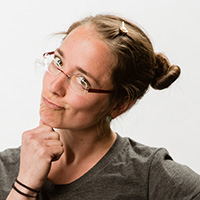A muse is a force personified as a woman who is the source of inspiration for a creative artist. I’ve always thought it would be awesome to be a muse—I could be like, “So, yeah. That song on the radio? It was totally inspired by me.” Some day.
Just a few famous muses throughout history include:
- The O.G. nine Greek mythology muses. (Their Pops, Zeus, must’ve been proud.)
- Pattie Body was George Harrison’s muse. (I <3 George!)
- Van Gogh found his muse in the city of Arles.
- Steve Spielberg deemed sci-fi master Ray Bradbury as his career muse.
The other day I listened to a Radiolab podcast about muses and it got me pondering.
I’ve never really thought about a muse as anything other than a source of inspiration, especially never in the form of a creative deterrent. But, the artist and the muse don’t always get along. It can be, and often is, a tumultuous relationship.
But the fact is, she [the muse] won’t be unmoved. She alights when it damn well pleases her. She falls in love with one artist, then deserts him for another. She’s a real bitch!
Wrangling the muse
In the podcast, I love how Elizabeth Gilbert (author of Eat. Pray. Love.) describes her muse as “it.” Seeing “it” as such allows Gilbert to distance herself from it. She can fight with it, negotiate with it, talk to it and—most importantly— walk away from it when she needs to. She sets terms and boundaries with her muse. But she has learned to respect, love and honor her muse and interact intimately to create great work.
Wow. Do I really want to be a muse? The more I ponder it, I think I’m gonna pass.
Unless Ray Lamontagne appears to me in a dream and wants to chat about some lyrics, in which case all bets are off. Until then, I’ll channel that inspiration into some damn good wireframes that’ll be sure to inspire some amazing feats of design.
What about you? What’s your source of inspiration? How do you interact with it? Tweet us @redonkmarketing #muse


